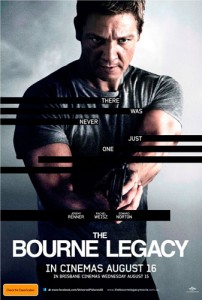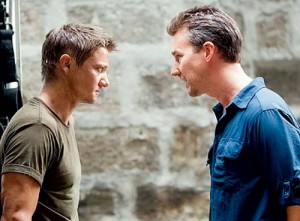
*SOME SPOILERS BELOW*
In this modern cynical age, it is a given that the world is rotten to the core, the structures of power and authority that govern it are hollowed out and corrupt, and those that work within it morally compromised beyond all redemption.
It is a world view embraced with gusto by The Bourne Legacy, the fourth film in the Bourne franchise, directed by Tony Gilroy, who wrote the first three films in the series which starred Matt Damon as Jason Bourne.
Loosely based on the books by Robert Ludlum, the films chronicled the struggle by an amnesia-affected Bourne to find out who he was and once cognisant of that, seek some form of redress from an amoral power apparatus that saw him as a means to achieving an end and nothing else.

It is a theme continued in the fourth film with Jeremy Renner playing Aaron Cross, a man who though fully aware of who he is from the start, nonetheless ends up on the run when the people overseeing his program react to its possible disclosure by terminating it.
This of course, means terminating all the people in it too and Renner as Cross does a superlative job of moving from his initial confusion to a steely resolve to survive as he races, much like Robert Redford did in Three Days of the Condor, to piece it all together in time to save both himself, and Dr Marta Schearing (Rachel Weisz), the only survivor of the lab who did all his medical checks, from untimely deaths.
At this point, you may have had a sudden attack of the “ho-hums” thinking it sounds like the sort of movie you have seen a thousand times before.
Yes there is the inevitable car chase across a crowded city – in Manila of all places which has the sort of crazy chaotic traffic you don’t want to commute in, let alone race for your life through – and a few cosy coincidences, but what elevates this movie, much as it did in the previous three Bourne films, is beautifully realised characterisation, and the sort of searing reality that many thriller movies shy away from in the interest of thrills and spills.

For instance, when one of Dr Schearing’s colleagues, clearly programmed to act in just this way should it be called for, snaps and wipes out the entire lab (bar Dr Schearing of course), the sense that death is frighteningly real and close is palpable. The violent taking of life isn’t sugar coated or given a cartoonish sheen by a sea of gratuitous bloodletting. It is so viscerally real that you feel like you are in the tight confines of the lab scrabbling for a place to hide along with all the poor victims of the shooting rampage, and just as scared for your life.
Dr Schearing too, unlike other characters in thriller movies who seem to rebound from near death experiences as if they have just recovered from a bad visit to the dentist, is demonstrably traumatised by her ordeal. Her reactions in the aftermath of witnessing the grisly deaths of people she worked with closely, is entirely in keeping with the sort of reactions real people would have. You wouldn’t just pick up and keep going and neither does she.

At least not initially. But when she is forced to go on the run, after meeting up with Cross, she forces herself to do what she needs to do to survive. Even then though, her reactions and that of Cross make sense. They are real people reacting to a situation neither of them is fully prepared for but who are determined to do what needs to be done to emerge intact on the other side.
While Cross does have the capabilities to survive, he is never portrayed as a ruthless killing machine doing what he needs to do to stay alive. But rather as a man whose trust has been betrayed in the most terrible way possible – by people, led by a coldly efficient Edward Norton as Retired Colonel Eric Byer USAF who heads the program that “created” Cross and others like him, that he believed had his best interests at heart and who gave him the sense of belonging he had never found as a ward of the state.

He manages to portray both a man fully intending to take back what has been taken from him, and a little boy lost, saddened and confused that the very people he thought were his saviours, are the ones trying to bring about his demise.
That is the magic of this movie. It is big, brash and ticks all the boxes for the sort of globe trotting thriller that it aspires to be, and is. But it is also an emotionally intense, intimate movie that features two very real people, who are forced to confront the fact that the realities of their lives have been turned on their head, and life, if they are able to carry on living it, will never be the same again.
It is as real as this kind of movie gets, and both Renner and Weisz masterfully invest their characters with the sort of aching sense of betrayal necessary to give all the action in the movie, of which there is a considerable amount, the emotional resonance they need to be truly effective.
The Bourne Legacy thus is that rarest of beasts – a thrilling, edge-of-your-seat action movie with a beating heart that reminds everyone watching that even the most unlikely of situations contain real people simply trying to make sense of their lives, and the flawed world around them.
More movies of the thriller genre would do well to heed its masterful example.